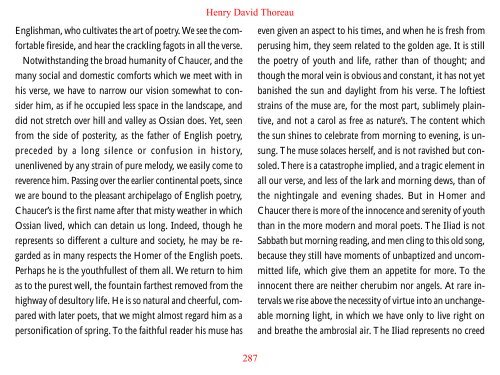A Week on the Concord and Merrimack Rivers - Pennsylvania State ...
A Week on the Concord and Merrimack Rivers - Pennsylvania State ...
A Week on the Concord and Merrimack Rivers - Pennsylvania State ...
You also want an ePaper? Increase the reach of your titles
YUMPU automatically turns print PDFs into web optimized ePapers that Google loves.
Englishman, who cultivates <strong>the</strong> art of poetry. We see <strong>the</strong> comfortable<br />
fireside, <strong>and</strong> hear <strong>the</strong> crackling fagots in all <strong>the</strong> verse.<br />
Notwithst<strong>and</strong>ing <strong>the</strong> broad humanity of Chaucer, <strong>and</strong> <strong>the</strong><br />
many social <strong>and</strong> domestic comforts which we meet with in<br />
his verse, we have to narrow our visi<strong>on</strong> somewhat to c<strong>on</strong>sider<br />
him, as if he occupied less space in <strong>the</strong> l<strong>and</strong>scape, <strong>and</strong><br />
did not stretch over hill <strong>and</strong> valley as Ossian does. Yet, seen<br />
from <strong>the</strong> side of posterity, as <strong>the</strong> fa<strong>the</strong>r of English poetry,<br />
preceded by a l<strong>on</strong>g silence or c<strong>on</strong>fusi<strong>on</strong> in history,<br />
unenlivened by any strain of pure melody, we easily come to<br />
reverence him. Passing over <strong>the</strong> earlier c<strong>on</strong>tinental poets, since<br />
we are bound to <strong>the</strong> pleasant archipelago of English poetry,<br />
Chaucer’s is <strong>the</strong> first name after that misty wea<strong>the</strong>r in which<br />
Ossian lived, which can detain us l<strong>on</strong>g. Indeed, though he<br />
represents so different a culture <strong>and</strong> society, he may be regarded<br />
as in many respects <strong>the</strong> Homer of <strong>the</strong> English poets.<br />
Perhaps he is <strong>the</strong> youthfullest of <strong>the</strong>m all. We return to him<br />
as to <strong>the</strong> purest well, <strong>the</strong> fountain far<strong>the</strong>st removed from <strong>the</strong><br />
highway of desultory life. He is so natural <strong>and</strong> cheerful, compared<br />
with later poets, that we might almost regard him as a<br />
pers<strong>on</strong>ificati<strong>on</strong> of spring. To <strong>the</strong> faithful reader his muse has<br />
Henry David Thoreau<br />
287<br />
even given an aspect to his times, <strong>and</strong> when he is fresh from<br />
perusing him, <strong>the</strong>y seem related to <strong>the</strong> golden age. It is still<br />
<strong>the</strong> poetry of youth <strong>and</strong> life, ra<strong>the</strong>r than of thought; <strong>and</strong><br />
though <strong>the</strong> moral vein is obvious <strong>and</strong> c<strong>on</strong>stant, it has not yet<br />
banished <strong>the</strong> sun <strong>and</strong> daylight from his verse. The loftiest<br />
strains of <strong>the</strong> muse are, for <strong>the</strong> most part, sublimely plaintive,<br />
<strong>and</strong> not a carol as free as nature’s. The c<strong>on</strong>tent which<br />
<strong>the</strong> sun shines to celebrate from morning to evening, is unsung.<br />
The muse solaces herself, <strong>and</strong> is not ravished but c<strong>on</strong>soled.<br />
There is a catastrophe implied, <strong>and</strong> a tragic element in<br />
all our verse, <strong>and</strong> less of <strong>the</strong> lark <strong>and</strong> morning dews, than of<br />
<strong>the</strong> nightingale <strong>and</strong> evening shades. But in Homer <strong>and</strong><br />
Chaucer <strong>the</strong>re is more of <strong>the</strong> innocence <strong>and</strong> serenity of youth<br />
than in <strong>the</strong> more modern <strong>and</strong> moral poets. The Iliad is not<br />
Sabbath but morning reading, <strong>and</strong> men cling to this old s<strong>on</strong>g,<br />
because <strong>the</strong>y still have moments of unbaptized <strong>and</strong> uncommitted<br />
life, which give <strong>the</strong>m an appetite for more. To <strong>the</strong><br />
innocent <strong>the</strong>re are nei<strong>the</strong>r cherubim nor angels. At rare intervals<br />
we rise above <strong>the</strong> necessity of virtue into an unchangeable<br />
morning light, in which we have <strong>on</strong>ly to live right <strong>on</strong><br />
<strong>and</strong> brea<strong>the</strong> <strong>the</strong> ambrosial air. The Iliad represents no creed

















